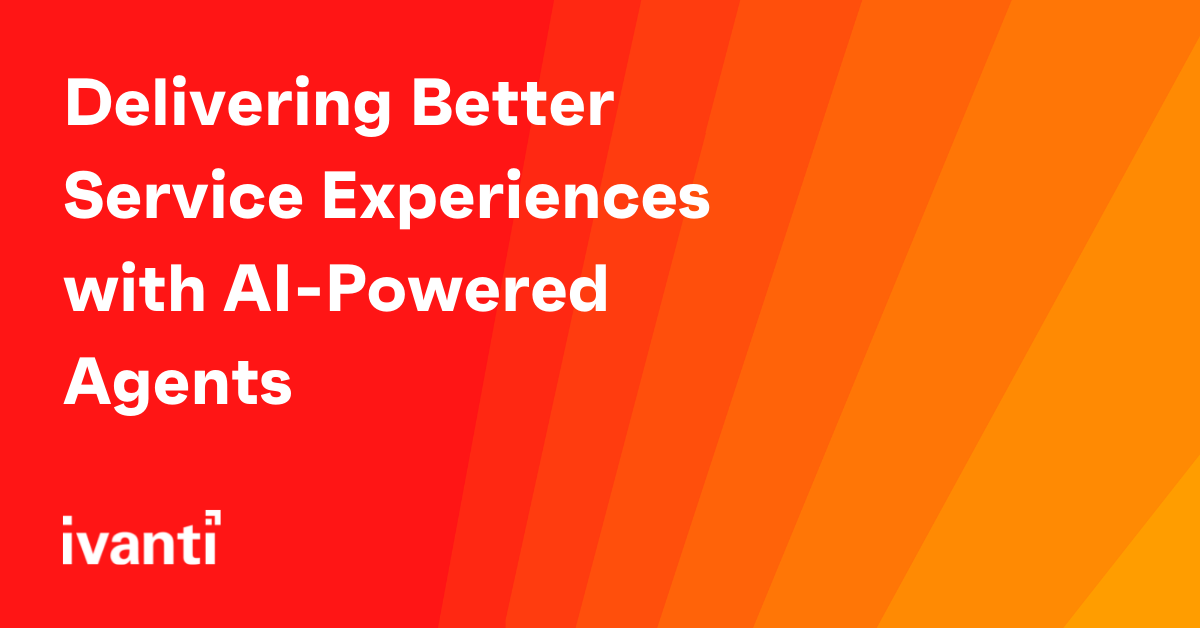Delivering Better Service Experiences with AI-Powered Agents
For the last two years, it’s an understatement to say we’ve witnessed big shifts in the relationship between most employees and their work environment. Many of us saw our work experience transform seemingly overnight into predominately a digital one as working from home became the ‘new normal.’
While this shift brought many advantages to employees, such as much shorter commutes (a walk down the hall), more flexible work hours (more ‘honey do’ opportunities) and lower costs (only need ‘above the waist’ outfits), it’s also raised many challenges for organizations. For example, many IT teams either accelerated planned initiatives or quickly developed new plans to support this huge increase in remote work. One IT director shared they felt they had ‘squeezed seven years of transformation into a few months’ when the pandemic hit. And surveys from research firms such as Gartner revealed most companies will continue to allow remote working at least part time going forward.
On the other side of this transformation, many employees likely had to quickly learn more than they thought they ever needed to about the inner workings of tools like Zoom, Teams, Slack, Webex or VPNs since they became critical to staying online and productive. With all this rapid change, It wasn’t surprising many service desk teams saw increases in incidents of one third or more as they worked to support employees making the shift to remote working. Many teams rose to meet these challenges such as the support manager I recently asked how they were able to handle over a hundred-fold increase in people they needed to support literally overnight. Their reply was a modest but impressive one - “I don’t know how we did it – we just did.”
Interactive Report: AITSM: How AI is Redefining IT Service Desk Automation
Better outcomes with Automation and AI
To help during these unprecedented times, many teams augmented their efforts to deliver services with automation and workflow engines. IT teams leveraged these engines to speed up resolutions and request fulfillments, removing manual steps while improving service quality. While delivering impressive results, the expectations on service teams to deliver even better digital experiences has only grown. The good news? The universe of available technologies and solutions to meet these rising expectations has grown as well.
One promising solution area is the addition of Artificial Intelligence (AI) to service management processes to deliver better experiences. The use of AI in our consumer lives has become commonplace with Siri or Alexa just a short phrase away to help us with an answer to a question or recommendation for something we want. Bringing a similar experience to our workplace world is one of the promises of AI augmenting service management teams, especially when AI is teamed with Natural Language Processing (NLP) and Natural Language Understanding (NLU).
One example of how this can work is the password reset request. For many service teams, resetting passwords may account for over a third of incoming calls. While it’s a routine task, it’s still an important one, especially to the employee who needs help getting back to work. This is one example where an AI powered service or agent on its own could help employees easily and securely reset their password to quickly get back to work. There are many more examples showing how AI agents can help reduce call volumes with full auto-resolution of issues and incidents, while delivering the digital experiences employees have come to expect in their workplace.
The probability of good employee experiences is dramatically increased when an AI agent is combined with the ability to better understand the context and meaning of what is being asked rather than just looking for keywords to determine which predefined path should be followed. Take this example of three requests:
- I can’t connect to Workday.
- How do I submit an expense report into Workday?
- Is next Monday a workday?
While each request includes something about ‘workday,’ the context and meaning of ‘workday’ in each is different. One is about application connectivity, the second is about process and the third is a question about the company calendar. Add in the fact there are several ways employees can ask the same question and you have the recipe for potential confusion and frustration. This is where adding NLP and NLU helps an AI agent better parse and understand what is being asked and how to best respond, including needed clarifying questions. These Conversational AI agents deliver more natural conversations between themselves and employees. Delivering outcomes that are as good if not better than what employees have now is one key factor toward the successful adoption of Conversational AI agents by employees. Combine the capability for agents to learn from each interaction and the likelihood of lower call loads and better experiences increases further.
One additional consideration is the integration of Conversational AI agents within the IT Service Management (ITSM) context. This makes it easier to log and keep track of all the activities and actions from these agents, helping improve governance while also providing data for trend analysis for potential corrective actions or changes. One more benefit? Your IT team still gets the credit for the work these agents do on your behalf.
I like to think of these agents as a component of your IT Co-Pilot, augmenting your team’s capabilities to be more efficient and consistent in delivering high-quality services and outcomes. Departments beyond IT, such as HR and Facilities, can also benefit from more self-service automation, as Conversational AI agents can be included as part of your Enterprise Service Management strategy.
By automating much more of the routine yet important responsibilities, Conversational AI agents promise to help free up more time so your teams can better focus on the key initiatives you’ve wanted to do, delivering better experiences and better outcomes all around.
To learn more about how Conversational AI agents can improve the service delivery experience, join this upcoming webinar.

